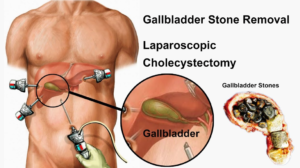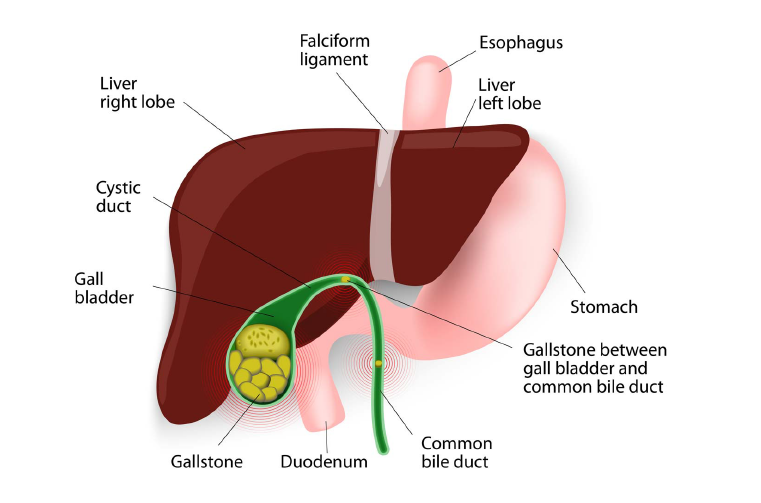Introduction
GallBladder Stones has become a common issue that affects many people. These little stones can cause big problems, but the good thing is that there are effective treatments available, including surgery. In this blogpost lets try to learn more about the gallstones and their treatment strategies.

What Are Gallstones?
Gallstones are small, hard deposits that form in the gallbladder, a small organ located beneath your liver. The gallbladder stores bile, a digestive fluid produced by the liver, and releases it into your small intestine when you eat to help digest fats. Gallstones can vary in size from tiny grains of sand to as large as a golf ball. They are typically made of cholesterol or bilirubin, two substances found in bile.
Why Do Gallstones Form?
Gallstones form when the balance of substances in your bile is disrupted. There isn’t always a clear reason why this happens, but some factors that can increase the risk of gallstone formation include:
1. Diet: A high-fat or low-fiber diet can contribute to gallstone formation.
2. Obesity: Being overweight can increase your risk.
3. Rapid Weight Loss: Losing weight too quickly can lead to gallstones.
4. Family History: If your family members have had gallstones, you may be more likely to develop them.
5. Certain Medical Conditions: Conditions like diabetes and liver disease can increase the risk.
6. Pregnancy: Hormonal changes during pregnancy can increase the risk of gallstones.
Symptoms of Gallstones
Many people with gallstones don’t experience any symptoms and may not even know they have them. However, when gallstones block the normal flow of bile, they can lead to symptoms like:
1. Pain: This is the most common symptom and usually occurs in the upper right part of the abdomen, just below the ribcage. It can be intense and last for several hours.

2. Nausea and Vomiting: Gallstone-related pain can make you feel nauseous and lead to vomiting.
3. Indigestion: You might experience bloating, gas, and difficulty digesting fatty foods.
 4. Jaundice: In rare cases, gallstones can block the bile duct, causing yellowing of the skin and eyes (jaundice) and dark urine.
4. Jaundice: In rare cases, gallstones can block the bile duct, causing yellowing of the skin and eyes (jaundice) and dark urine.
When Is Surgery Needed?
Not all gallstones require surgery. In fact, if you have gallstones but no symptoms, your doctor may recommend a “watch and wait” approach. However, surgery is often necessary in the following situations:
1. Recurrent or Severe Pain: If you have frequent, intense pain from gallstones, surgery is usually the best option to remove the gallbladder.
2. Complications: Gallstones can cause inflammation of the gallbladder (cholecystitis) or block the bile duct. These are serious issues that often require surgery.
3. Gallbladder Polyps: If you have large polyps in your gallbladder, they may need to be removed surgically.
4. Diabetes or Other Health Issues: If you have diabetes or certain other health conditions, your doctor may recommend surgery even if you don’t have symptoms to prevent complications.
Gallbladder Surgery

The most common surgery for gallstones is called a cholecystectomy. It involves removing the entire gallbladder. Don’t worry; your body can function perfectly fine without it!
Here’s what to expect:
1. Laparoscopic Surgery: Most gallbladder removals are done laparoscopically, which is a minimally invasive technique. Small incisions are made in the abdomen, and a tiny camera and specialized instruments are used to remove the gallbladder. Recovery is typically faster with this approach.
2. Open Surgery: In some cases, open surgery may be necessary, especially if there are complications or if laparoscopic surgery isn’t possible due to certain medical conditions.
3. Recovery: After surgery, you may need to stay in the hospital for a day or two. Most people can return to their normal activities within a week or two, but you’ll need to follow your doctor’s recommendations for diet and lifestyle changes.
Conclusion
Gallstones can be a painful and disruptive condition, but with the right treatment, you can find relief and get back to enjoying life. Remember, surgery is just one option, and your doctor will help you make the best decision based on your unique situation. If you’re experiencing symptoms or have concerns about gallstones, don’t hesitate to reach out to a healthcare professional for guidance and support. Your health is important, and there are solutions available to help you feel better.
Here are a few of the many patient testimonials who have undergone successful Gall bladder surgeries .




